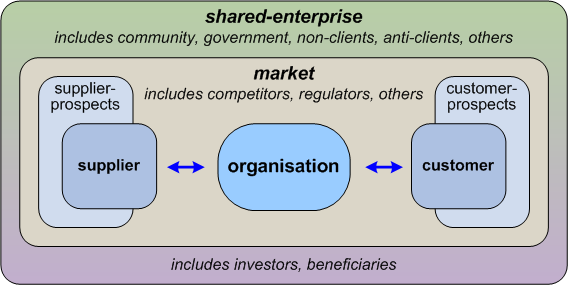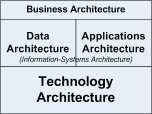In the old Norse children’s tale, there’s a troll that lives under a bridge, that eats the life-force of anyone who tries to pass. It’s a useful bridge, sure, and it’s easiest to pass that way, if the troll wasn’t there. But it is there – which is, yes, a problem, if we must get to the other side. Yet it’s not the only bridge to the other side: there’s always another way, even if it takes longer and goes by a more roundabout route. Hence it’s not worth much effort here to try to make things change, bashing and bashing against a troll: that just gives it more of what it wants, which is our attention and life-force. In practice, it’s best to limit it to three tries – three billy-goats, in the old tale – after which it’s time to move on and find a different route around the impasse.
Kinda feels that way right now with the ‘specialism-troll’ problem.
The smallest goat: I tried tackling the specialism-troll problem once in that LinkedIn thread, and got shouted at for my pains. Great…
The middle-sized goat: I tried tackling the specialism-troll problem here, in the previous post: got misunderstood again, with people thinking that I’d said that they were the troll, or once again seemingly saying that it’s ‘unprofessional’ to call out destructive troll-like behaviour. Oh joy…
So let’s try the third goat, the biggest goat, to give it one more bash – explaining the point with even more point-by-point care.
If that doesn’t work? – well, just forget it. There’s always another way around the roadblock. Or build a different kind of bridge where there’d be no place for a troll to hide. Either way, after three tries, it’s time to move on.
But right now, the third try – “the third time of asking” and suchlike. One more try, okay?
Let’s do this step-by-step, in three stages:
- trolls, or trolling-type behaviours
- the particular problem of becoming over-centred on specialism
- the crucial concern of context
First, trolling is a type of behaviour, not a person. It’s unfortunate that English doesn’t distinguish between ‘is’ as a permanent state versus ‘is’ as a transitory condition – that so-useful ‘is-ness’ distinction in Portuguese between ser and estar, for example. The nearest we could get to describe it in English is to say that it’s not that someone is a troll, but does a troll, or acts as a troll. If someone is a troll, there’s no possibility of change; but if someone does a troll, or acts as a troll, there is the possibility of change – and for the better, we’d hope. Once that distinction is clear, we have some chance of this explanation going somewhere useful. (If not, then not, and it’d be best to just move right on right now.)
In online-discussions and the like, ‘trolling’ is a term used to describe a particular type of destructive behaviour. It disrupts the thread, dragging the conversation away from its nominal topic or concern, often to the extent of destroying the purpose of conversation in the first place, and certainly destroying any value in it for most people.
There are some people who indulge in this kind of behaviour, online and elsewhere, almost all of the time. Those are the ones we describe as ‘trolls’. They’re often people who, for one reason or another, are deeply addicted to the power-over delusion of ‘stealing’ power from others – “prop self up by putting other down”, or simply by ‘stealing’ others’ attention. Kinda sad, really, though not easy to resolve, because it does need to be addressed as a literal addiction.
The key point here is that all of us are prone to falling into troll-like behaviours. I don’t know anyone who hasn’t fallen into it at some time or other. Whenever we get too stuck on a point, too insistent upon the validity or exclusive-’truth’ of our own knowledge and experience, then yes, right there, right then, we’re acting as a troll. Which doesn’t help: not us, not anyone. Not a good idea.
To put it at it’s simplest, friends don’t let friends get stuck into acting as trolls. It’s not that it’s ‘unprofessional’ to call someone on that behaviour, it’s that we need to see it as unprofessional to not call them on it. Call us on it when we do it: that’s the real challenge here.
Yet since we all do it, yet probably don’t even notice when we are doing it, and even our friends may be coy about calling us on it, what can we use as a professional-type guideline here? The short-answer is the same as in the children’s tale of Three Billy-Goats Gruff:
- one gentle warning; then if that doesn’t work:
- one firmer warning; then if that doesn’t work:
- one full-tilt no-messing-about head-on charge
After that, if we still haven’t got the message, it’s time for everyone to leave us to our trolling, and move along to a different bridge – because there’s always another bridge. Which would, however, be a bridge without us – to our loss. Hence good friends don’t let their friends get stuck too long in trolling… and good professionals don’t let other professionals get stuck in trolling, either.
Yet where does specialism come into this picture? What’s different about ‘specialism-trolls’ or ‘specialism-trolling’? The short-answer is that it’s one place where even the most careful of us are at real risk of trolling – whether we intend to or not.
When we’re in our specialism, we know this stuff. We know how to make things happen, make things work, using our knowledge and experience of this specialism. And others don’t. Which means that it’s probable that we have something really valuable to bring to the table - when it’s the right time to do so.
Yet there’s the catch, right there: “when it’s the right time to do so”. If it’s not the right time to do so, it’s going to be a distraction, a disruption, a darned-nuisance – in other words, trolling, if only in a minor form at first. But if we keep on doing it, going over and over the same off-the-thread assertions, yeah, that’s trolling for real. And if we can’t see it, and our friends and colleagues are too misplaced-’polite’ to call us on it, all we’d be doing is wasting everyone’s time and attention – including our own. Oops… Not A Good Idea, all round.
How does it happen? How can we spot ourselves doing it? – preferably soon enough to stop ourselves doing it before any real damage is done? Again, the short-answer is that’s driven by misplaced certainty about something that, almost by definition, is somewhat uncertain – otherwise professionals probably wouldn’t bother to discuss it in the first place. What happens then is that we place our own knowledge or specialism as ‘the Truth’, ‘the Answer’, ‘the Centre Of Everything’ – and demand attention from everyone else, because we have that ‘the Answer’. Which, in an uncertain context, it probably isn’t. Working with the uncertainty is why we have discussion.
(But preferably not percussion, or concussion, or plain everyday cussin’ – though they’re perhaps rather too closely related…? ![]() )
)
So here’s a simple diagnostic:
- if what we think we have is ‘the Truth’, that must apply everywhere for everyone, then we’re probably specialism-trolling
- if we think or purport that our own experience is the same for everyone (as in many of the misuses of the slogan ‘the personal is political’), then we’re probably specialism-trolling
- if we’re pushing a single ‘Solution’ as ‘the Answer to Everything’ (as vendors so often do), then we’re probably specialism-trolling
And, in particular:
- if we’ve gone round the same point for more than perhaps three times, without moving forward or rethinking our own position, then we’re almost certainly specialism-trolling
And every time any of us do any of this, we all lose energy, attention and value from would otherwise be a fast-paced, valuable exploration of some theme or other. It’s not helpful, to anyone – including us. Yet the reality is that we all do it, from time to time: it’s a very human consequence of being good at what we do.
There’s also the very human tendency to indulge in ‘serial monologues’ rather than true dialogue. It’s so easy to plan ahead what we’re going to say, how we’ll bring in that one point that’ll swing the whole argument – and get so wrapped-up in all of that planning and preparation that we completely miss the fact that, by the time we get there, the conversation has already moved on to a different space. Again, something that we need to watch for, all the time.
The key point, though, is that when we drop into this troll-like behaviour, we’re not ‘trolls’ in the common sense of the term: unlike those who genuinely are addicted to parasitising energy and attention from others, we do still have choices in this. (Or should, we’d hope…) As professionals, we’d expect to gain our gratification from the quality of our work, the quality of our real-world outcomes – not from delusions of ‘propping ourselves up by putting others down’. Yet when faced with this kind of behaviours – perhaps especially from ourselves, even more so than from others – then yeah, it’s kinda hard to get the balance right… Just notice it, face it, be respectful about it – at least until it’s gone beyond that three-times warning, perhaps. That’s about it, really: not much more than that.
Which, however, brings us to that point about context - and in particular, how specialism-trolling tends to arise cross-disciplinary contexts such as enterprise-architecture.
From various responses I’ve had so far, it’s all too clear that people have gotten confused around questions about the effective scope of enterprise-architecture and the like, versus how this affects generalists working within any context - any scope, at any scale.
Okay, yes, it’s well-known that my own understanding of the scope of enterprise-architecture is a lot wider than many would accept. To me, I always aim to consider a scope that goes way out beyond the boundaries of the organisation:
The reason I go out that far is because, for my kind of clients, I need to be able to explore concerns such as the impacts of anticlients and the like. But yes, I am well aware that most enterprise-architects won’t need to do that – not in their everyday work, anyway. Crucially, though, the fact that I work with a larger scope doesn’t make me ‘better’ than anyone else: it’s just a different scope – nothing more than that. (In fact there are plenty of contexts or concerns where it’s too broad a scope to be useful – and yes, I’m well aware of that point, too.)
The key point here – the fundamental point – is that it’s fractal. It’s not about the scope as such: it’s about relationships within and across the respective scope, and with other contexts both broader and narrower in scope.
Hence, for example, let’s take the classic ‘BDAT-stack’ so popular in mainstream enterprise-architecture:
Even the broadest scope there – ‘Business Architecture’ – is quite a lot narrower than even ‘the Organisation’ in that context-map above; in the broader scheme of things, ‘[IT] Technology Architecture’ is definitely a lot narrower again. And yet it is a full, and fully-valid, architectural context in its own right: that’s what should be self-evident, straight away, as soon as we say about architecture that “it’s fractal”.
Hence, for example, IT-infrastructure architecture is likewise plagued by its own specialism-trolls. There you are, getting some real value out of a discussion about optimal server-to-router cabling and rack-configurations for different types of data-centre regimes, and then suddenly someone sparks off a side-argument about server-hardware, which spins off into a full-on flame-war about Intel versus AMD chipsets. At which point the only useful thing you can do is to accept that the thread is effectively dead – so walk away and leave them to it. Sigh.
Doesn’t matter whether you’re on LinkedIn, StackOverflow, CultOfMac or wherever, it happens nearly every darn time, doesn’t it? Oh well.
But it likewise doesn’t matter if you’re doing infrastructure-architecture, data-architecture, security-architecture, brand-architecture, business-architecture, whatever – you’re still going to get the same darn problems with specialism-trolls. And that’s the whole point here: it’s not about specific items of content within one specific type of context, but about patterns of relationship within any kind of context.
They’re the same patterns everywhere – regardless of where we are, regardless of what domain we’re working in. That’s what “it’s fractal” means. (In this type of context, anyway.)
We could probably summarise it as follows:
- Every context is part of a larger context.
- By corollary, every context contains and/or intersects with many other contexts.
- The boundaries of a context are what we choose as boundaries for that context.
- Ultimately, everything depends on everything else.
- Everywhere and nowhere is ‘the centre’, all at the same time.
All of which tells us that any kind of over-focus on specialism, anywhere, is going to be a problem.
The catch, of course, is that specialism is how things get done. (Or are believed to be done – which is not necessarily the same thing.) Which is why specialism gets noticed; it’s why specialists get all the credit, even when all too often all they’ve really done is make things even more fragmented than they already were to start with (a process I sometimes describe as ‘Dotting the joins‘). Whilst the poor old generalists mostly just get the blame – even though often they’re all too literally the only ones holding it all together. Sigh.
I sometimes wonder if the over-specialism that leads to an overdose of specialism-trolls is more a characteristic of larger countries. The inverse seems to have been true in the development EA in the smaller countries, in part because we simply didn’t have enough people to permit much indulgence in the luxury of hyperspecialisation: from sheer necessity, pretty much everyone ended up as some kind of generalist, whether they wanted to be so or not. It meant that we probably didn’t know the fine-detail as well as the big-country specialists, but overall we were still pretty good at getting things to work – perhaps in particular, getting things to work as a unified whole. Over-specialism has its serious disadvantages too… and the most serious of those, by far, is that bewretched tendency towards fragmentation.
The other side, perhaps, is a somewhat-subtle ego-trap: an over-investment of self in the specialisation. Hence what we might describe as an ‘I-shaped’ skill-set: everything focused around that one narrow domain, with no connection as such to anything else. By contrast, the minimum we’d need in any kind of architecture is a ‘T-shaped’ skill-set, or ‘Π-shaped’: one or more deep-skills, but also a strong set of ‘hooks’ into other domains. Even better for an architect, perhaps, would be a skill-set something more like an inverted ‘±’ shape, or a ‘¥’ shape: depth where required, but multiple layers of hooks spreading outward to connect with a wider and wider range of specialisms in ever-broader domains. When we’re spread that thin, and ‘wrong’ (or at least a lot less-knowledgeable) relative to all of those specialists, there ain’t much room for an overblown ‘I-shaped’ ego… – not one that can get the work done, anyway.
Yet without that overblown-ego, it is hard to stand our ground against the ‘I-shaped’ specialists, each of whom will want their specialism to be ‘the sole centre of everything’ – because as far as they’re concerned, it already is ‘the sole centre of everything. Which is why – in enterprise-architecture especially – we really, really need to stand up and challenge any tendency towards specialism-trolling: because it’s the one type of behaviour that most fragments all of our hard work.
So, to summarise:
- specialism-trolling isn’t a person, it’s a disruptive type of behaviour, to which we all are prone at times
- it tends to arise whenever someone attempts to make their own domain or specialism into ‘the centre’ of an architecture – or whenever they refuse to allow the architectural focus to move on after it’s transited through their domain
- it’s not related to architectural scope – it’s a pattern of behaviour that may occur within any architectural context
I’ll leave it there: I hope this makes a bit more practical sense this time, anyway?
Over to you for comment, of course.


